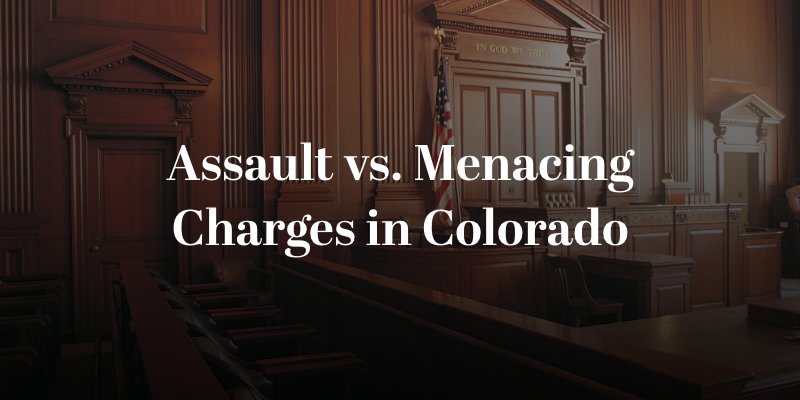Assault vs. Menacing Charges in Colorado
Criminal charges can be confusing, especially when it comes to criminal charges such as assault and menacing. Many people often use these terms interchangeably, but they are actually two distinct charges that carry different legal consequences in Colorado.
Understanding the differences in the elements of the crime as well as the penalties is essential if you find yourself facing assault charges in Colorado Springs.

Assault Charges
In Colorado, assault is a term used to describe incidents where one person causes physical harm or injury to another. It’s a serious offense that brings steep consequences under criminal laws. There are different categories of assault charges in the state:
First-Degree Assault
This represents the most serious assault charge. First-degree assault typically entails intentional and deliberate acts that lead to significant injuries caused by using a deadly weapon:
“With intent to cause serious bodily injury to another person, he causes serious bodily injury to any person by means of a deadly weapon.”
It can sometimes include actions that are not intentional if they are done with extreme indifference to human life:
“Under circumstances manifesting extreme indifference to the value of human life, he knowingly engages in conduct which creates a grave risk of death to another person, and thereby causes serious bodily injury to any person.”
First-Degree Assault Penalties
First-degree assault is a class 3 felony and is punishable by up to 32 years in prison and fines reaching $750,000.
Second Degree Assault
Second-degree assault occurs when there is severe bodily injury inflicted without utilizing a deadly weapon:
“With intent to cause bodily injury to another person, he or she causes such injury to any person by means of a deadly weapon.”
The primary difference between first-degree and second-degree is the severity of the injury. Second-degree assault involves an injury while first-degree involves a serious bodily injury.
Second-Degree Assault Penalties
Second-degree assault is a class 4 felony and is punishable by up to 16 years in prison and fines reaching $500,000.
Third-Degree Assault
Third-degree assault includes causing bodily injury with a deadly weapon but when it’s done negligently:
“The person knowingly or recklessly causes bodily injury to another person or with criminal negligence the person causes bodily injury to another person by means of a deadly weapon.”
This is a less serious charge than the other degrees of assault but should still be taken seriously, as it can lead to significant fines and jail time.
Third-Degree Assault Penalties
Third-degree assault is a class 1 misdemeanor and is punishable by up to 180 days in jail and fines of up to $1,000.
Menacing Charges
In Colorado, the crime of menacing refers to situations where an individual intentionally uses threats or intimidating actions that place another person in fear of immediate severe bodily injury or death.
“A person commits the crime of menacing if, by any threat or physical action, he or she knowingly places or attempts to place another person in fear of imminent serious bodily injury.”
No actual physical contact is required here. In these circumstances, menacing is a class 3 misdemeanor.
However, in some cases, it is elevated to a class 5 felony charge:
“…it is a class 5 felony if committed:
- By the use of a deadly weapon or any article used or fashioned in a manner to cause a person to reasonably believe that the article is a deadly weapon; or
- By the person representing verbally or otherwise that he or she is armed with a deadly weapon.”
Menacing Penalties
If you’re convicted of menacing as a class 3 misdemeanor, you face up to 1 year in jail and a fine of up to $1,000. If you’re convicted of menacing as a class 5 felony, you face up to 3 years in prison and fines of up to $100,000.
Understanding the differences between assault and menacing charges in Colorado Springs might feel overwhelming, but doing so is essential when facing or supporting a loved one who is facing one of these charges. In either case, working with a criminal defense lawyer is always advisable.
Contact us today to schedule a free consultation.
